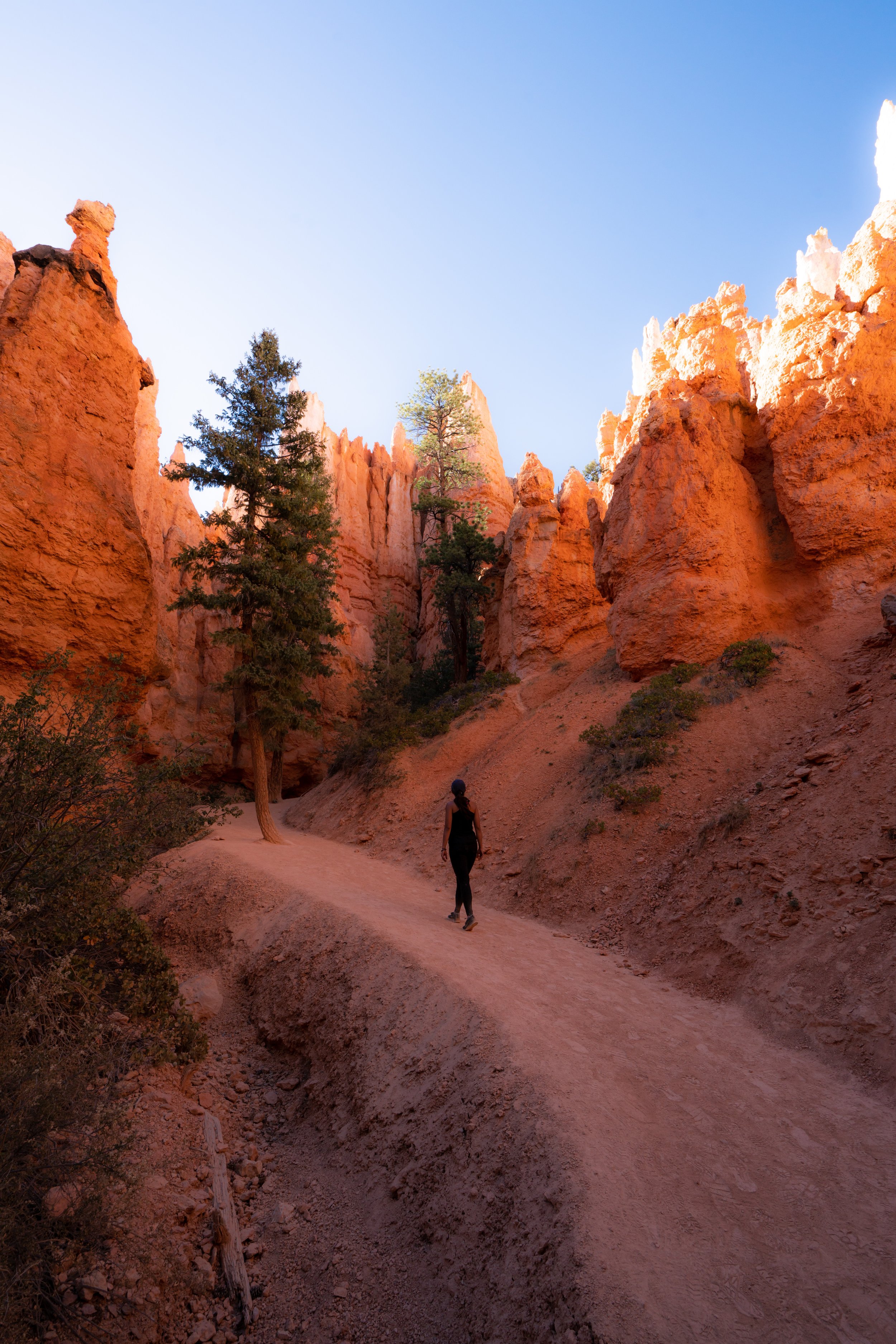Hiking the Under-the-Rim Trail (North to South) in Bryce Canyon National Park
Distance: 22.9 miles / 36.9 km
It has been said that when you’ve completed the Under-the-Rim Trail, you’ve truly seen Bryce Canyon National Park!
That said, the Under-the-Rim Trail is what Rim to Rim is to the Grand Canyon or the Wonderland Trail is to Mt. Rainier. It is Bryce Canyon National Park’s longest trail, and it is not often hiked in its entirety by most visitors, even those who camp at different sites along the trail.
In any case, the full Under-the-Rim Trail is generally undertaken over the course of a few nights at the various campsites along the trail. However, if you’re interested in a one-day hike like I did, I encourage you to read through the full article, taking note of the various water sources and my personal time, which can be used as a reference for a safe trip.
How to Get Under-the-Rim Trail Permits?
Permits are not required for day hikes on the Under-the-Rim Trail. However, if you are interested in staying at any of the seven different campsites within the park, permits are required for all overnight stays.
With that in mind, permits for the Under-the-Rim Trail are among the least competitive of any backcountry National Park trip, and in many instances, they can be reserved the day before through Recreation.gov.
Book Here: Under-the-Rim Trail Permits
Under-the-Rim Trailhead Parking
Parking for the Under-the-Rim Loop Trail is located at either Bryce or Rainbow Point, depending on which direction you’d prefer to hike.
That being said, the small parking area for Bryce Point tends to be one of the more congested trailheads in Bryce Canyon, given that a number of different adventures begin at this one location. However, if you begin the Under-the-Rim Trail early in the day, finding parking is usually not an issue.
Google Maps Directions: Under-the-Rim Trailhead (Bryce Point)
Hiking Checklist - Bryce Canyon
Obviously, for camping, you will need general backpacking gear. For this reason, I wrote a separate post about what backpacking gear is worth the money, from my experience, and what the best alternatives are to save you money.
Read My Separate Post: Best Ultralight Backpacking Gear
In addition, here is a complete list of must-have things that you will want for any hike in Bryce Canyon National Park.
Hiking the Under-the-Rim Trail
As previously mentioned, the Under-the-Rim Trail is often hiked in a variety of ways, including shorter day hikes utilizing the connector trails, staying at only specific campgrounds along the way, and, most notably, hiking south to north because Rainbow Point is higher than Bryce Point.
However, I opted for a one-way thru-hike from north to south because I was more interested in hiking lighter, while still having the opportunity to see the entire trail.
This is obviously the least common approach to the Under-the-Rim Trail, but I can confidently say that hiking from north to south was easier in terms of ascending in and out of Bryce Canyon because the ascent/ descent from the north is longer, with more elevation change than the climb in and out of Rainbow Point.
Since I was hiking all 22.9 miles (36.9 km) in one day, I began the Under-the-Rim Trail shortly after sunrise, and it took just under ten and a half hours, moving slowly and taking lots of photos!
Under the Rim-Peek-a-Boo Junction
After just 0.1 miles (0.2 km), the Peek-a-Boo Loop Trail and Under-the-Rim Trail split from one another.
Here, go right to stay on the Under-the-Rim Trail, but if you’re interested in learning more about the full Peek-a-Boo Loop Trail, I encourage you to read more in my separate post.
Read My Separate Post: Peek-a-Boo Loop Trail
Bryce Canyon Wilderness Boundary
Not long after the Peek-a-Boo Loop junction, the Under-the-Rim Trail begins its descent and enters the Bryce Canyon Wilderness Area.
That said, all backcountry regulations, as per the Wilderness Act of 1964, apply to the Bryce Canyon Wilderness Area.
As previously mentioned, this descent is much more significant than that from Rainbow Point, making the hike from south to north more challenging, in my opinion.
Once at the bottom of Bryce Canyon, the Under-the-Rim Trail begins to parallel the Right Fork of the Yellow Creek until it crosses over, just after the campsite.
Right Fork of the Yellow Creek Campsite
The Right Fork of the Yellow Creek campsite is the first of seven different campsites on the Under-the-Rim Trail, but, in my opinion, the next two Yellow Creek campsites are much more beautiful!
Right Fork of the Yellow Creek
The Right Fork of the Yellow Creek is said to be fed by a small spring, but know that all water sources on the Under-the-Rim Trail can be unreliable under drought conditions.
This is roughly where the low point is on the entire Under-the-Rim Trail.
It is for this reason that I prefer to hike from north to south because from here to Bryce Point, the hike is roughly 1,450 ft. (442 m) of elevation gain over a tedious 4.2 miles (6.8 km), versus 1,200 ft. (366 m) over 2.4 miles (3.9 km).
I guess I’d personally prefer a shorter but steeper ascent.
Yellow Creek Group Campsite
The first Yellow Creek campsite is the group site, but if you have a smaller party, I recommend the second campsite just after the crossing because of the beautiful sections that follow shortly after.
Yellow Creek
When hiking the Under-the-Rim Trail from north to south, the Yellow Creek crossing can be one of the more confusing parts of the entire hike, as the trail on the far side can be difficult to find.
That being said, go straight across the creek when the trail reaches the banks of the stream, even though it may seem as if the trail heads upstream.
Yellow Creek Campsite
The Yellow Creek campsite on the far side of the crossing is one of my favorites on the entire trail because of the sections to come!
I say this because the switchbacks that follow are one of the most beautiful parts of the entire Under-the-Rim Trail, and they would make for a great sunrise hike if you were staying at Yellow Creek.
This is the beginning of the switchbacks that I feel are among the most beautiful parts of the entire Under-the-Rim Trail!
Sunrise here would really be something to see!
Following these switchbacks, the trail traverses a number of rolling hills, as it nears the Seven Mile Viewpoint — the first viewpoint toward the end of the trail!
If you’re hiking from north to south, go right at this split to stay on the Under-the-Rim Trail.
Seven Mile Viewpoint
At roughly 7.0 miles (11.3 km), the trail crests over the hill shown above, where the views finally open up toward Rainbow Point for the first time!
This turn in the trail is unofficially known as the 'Seven Mile Viewpoint'.
Following the viewpoint, the Under-the-Rim Trail begins to descend down toward Pasture Wash, as there is really no consistency in the trail when it comes to climbing or descending.
Pasture Wash
This is Pasture Wash, and the trail continues straight across on the far side.
This second crossing is simply a smaller fork that feeds into Pasture Wash.
Following Pasture Wash, the Under-the-Rim Trail begins climbing a number of hills toward the popular Swamp Creek Trail, the first of many connector trails that link up with the Under-the-Rim Trail.
Under the Rim-Sheep Creek Junction
The Sheep Creek junction, more commonly known as the Swamp Creek Loop Trail, is the first of two connections with the Swamp Canyon Overlook off of Bryce Canyon Road up above.
That being said, stay straight (right) at this split to continue on the Under-the-Rim Trail, which is also the direction to hike out of Bryce Canyon.
Under the Rim-Swamp Canyon Loop Junction
Then, immediately after the Sheep Creek Trail split, the real connection with the Swamp Canyon Loop will be found.
If, for any reason, you need to leave the Under-the-Rim Trail, go right to begin the climb up to the Swamp Canyon Overlook, about 2.3 miles (3.7 km) away.
However, go left to continue on the Under-the-Rim Trail, which is also the lower section of the full Swamp Canyon Loop.
Read My Separate Post: Swamp Canyon Loop Trail
In my experience, the next 1.1 miles (1.8 km) along the lower section of the Swamp Canyon Loop Trail is the busiest section of the entire Under-the-Rim Trail, due entirely to day hikers beginning at the Swamp Canyon Overlook.
As the Under-the-Rim Trail begins to enter burn zones from years past, you’ll want to be hiking with a hooded sun shirt—especially if you’re visiting Bryce Canyon during the hot summer months!
Right Fork Swamp Canyon Campsite
Of all the campsites off the Under-the-Rim Trail, the Right Fork of Swamp Canyon and the Swamp Canyon campsite off the Whiteman Trail are the two easiest to reach, as both are roughly 1.0 mile (1.6 km) below Bryce Canyon Road up above.
Under the Rim-Swamp Canyon Loop Junction
At the next split, go left to continue on the Under-the-Rim Trail, which is where the Swamp Canyon Loop begins the ascent back up to the Swamp Canyon Overlook.
With that in mind, know that the Whiteman Trail, the next connector trail, is another 1.7 miles (2.7 km) away, should you need to hike back out for any reason.
Read My Separate Post: Swamp Canyon Loop Trail
Next, the Under-the-Rim Trail begins to pass by Swamp, Mud, and Noon Canyon Butte, which are three of the most prominent landmarks on the entire trail.
This is where the Under-the-Rim Trail really begins to feel like you’re making progress, as the miles are much straighter compared to the first eleven plus miles up to this point!
Swamp Canyon Creek
In my experience, Swamp Canyon Creek was the cleanest-looking water source of any on the entire Under-the-Rim Trail.
However, this is just what I saw when I did the hike in mid-May, so I can’t speak to how it may look throughout the hot summer season.
Mud Canyon
When you don’t know what to expect around each corner, places like Mud Canyon can make for some of the biggest surprises, as the ground quite literally drops out from beneath you!
Under the Rim-Whiteman Junction
The Whiteman Connector Trail is the next connection following the Swamp Canyon Loop, and it’s important to know that this is the last route up to Bryce Canyon Road for the next 4.6 miles (7.4 km); the next being the Agua Canyon Connector Trail.
Swamp Canyon Campsite
As previously mentioned, the Swamp Canyon campsite, along with the Right Fork of Swamp Canyon, are the two easiest campsites to access because of their proximity to their respective connector trails.
That being said, I think that Swamp Canyon would be my preferred choice because of how close it is to the beautiful Mud Canyon shown above, and because you’re more likely to have a quiet stay as opposed to the day hikers that frequent the Swamp Canyon Loop Trail.
This gate signifies the first of three different times the Under-the-Rim Trail leaves Bryce Canyon National Park for the Dixie National Forest.
That being said, not all of the boundary crossings are as noticeable as this one.
Then, at about 14.5 miles (23.3 km), I finally took a break for something to eat, which was actually the first food I had eaten all day! 😬
This is where the Under-the-Rim Trail re-enters Bryce Canyon National Park.
Along the hike, there were a few—not many—eroded steep sections like this to watch your footing, as a fall here could certainly mean more than a bruise.
Bridge Canyon Creek
This crossing, right before the Natural Bridge campsite, is Bridge Canyon Creek, but in my experience, it didn’t appear to be the most reliable place to get water if you were staying the night.
Natural Bridge Campsite
The Natural Bridge campsite, located beneath the Natural Bridge Overlook off Bryce Canyon Road up above, is the second-to-last campsite before the climb up Ponderosa Ridge to Rainbow Point.
Agua Canyon Creek
Should you be staying at the Natural Bridge campsite, there are a number of different forks off Agua Canyon Creek that may be more reliable than Bridge Canyon Creek shown previously.
Then, the Under-the-Rim Trail leaves Bryce Canyon National Park for the second, and shortest, of all three times.
When the trail comes to Agua Canyon Creek again, cross over to the south side where the trail should become more obvious.
After Agua Canyon, the Under-the-Rim Trail begins to climb up to the Agua Canyon Connector Trail, located where the trail crests over the ridge.
Under the Rim-Agua Canyon Junction
Finally, the Under-the-Rim Trail reaches the Agua Canyon Connector Trail, which is the final connector trail before Ponderosa Ridge that leads up to Rainbow Point.
That being said, the Agua Canyon Connection is also where Rainbow Point noticeably begins to look closer than anywhere prior.
On a different note, it’s important to mention that this section of the Under-the-Rim Trail is where bear activity is known to be the highest.
That is not to say that black bears are common, but it is just something to be aware of.
North Fork of the Ponderosa Creek
The North Fork of the Ponderosa Creek was one of the steeper drops to climb down and up in order to cross safely.
Next, the Under-the-Rim Trail leaves Bryce Canyon National Park for the third and final time.
South Fork of the Ponderosa Creek
After the Dixie National Forest boundary, the Under-the-Rim Trail crosses the South Fork of the Ponderosa Creek, which, in my experience, had less water than the North Fork.
This is the final re-entry back into Bryce Canyon National Park.
As the trail nears the Iron Spring Campsite, the National Park Service warns of bear activity because of historical encounters that have happened here in the past.
That being said, black bear encounters are not likely, but not uncommon either, as I have had one encounter on the nearby Riggs Spring Loop Trail in the past.
Iron Spring Campsite
In my opinion, Iron Spring, along with the Yellow Creek Campsite on the far northern end of the trail, are the two most beautiful places to camp on the entire 22.9-mile (36.9 km) Under-the-Rim Trail.
I say this because of the views of the hoodoos along the canyon rim, but that’s just one person’s opinion, and someone else might feel differently.
North Fork of the Black Birch Canyon Creek
These next three crossings over the forks of Black Birch Canyon Creek are the last places to find water, as the Under-the-Rim Trail begins to climb Ponderosa Ridge shortly ahead.
Black Birch Canyon Creek
This is the main Black Birch Canyon Creek, which is said to be one of the 'more reliable' sources on the trail.
However, I suggest taking this advice lightly, as there wasn’t much water, and I was only hiking the trail during the middle of May.
South Fork of the Black Birch Canyon Creek
This final crossing over the South Fork of Black Birch Canyon Creek was a nice mental checkpoint that I was nearing Ponderosa Ridge and the end of the Under-the-Rim Trail!
Ponderosa Ridge
As the Under-the-Rim Trail starts to leave Black Birch Canyon behind, it begins the infamous final ascent up Ponderosa Ridge to Rainbow Point.
That being said, Ponderosa Ridge is a much faster ascent with less elevation gain compared to the north, regardless of the fact that it’s higher than Bryce Point because of how hilly the full Under-the-Rim Trail really is!
Black Birch Canyon
It was cool to see that Bryce Canyon was still holding onto patches of snow in May in the most shaded, upper-elevation areas.
This section on Pondersoa Ridge, just below Rainbow Point, is often considered to be one of the most beautiful parts of the entire Under-the-Rim Trail.
With that in mind, Ponderosa Ridge can make for a great day hike—especially at sunrise—because it’s so close to the parking lot up above.
Under the Rim-Riggs Spring Loop Junction
After the panoramic sections on Ponderosa Ridge, the Under-the-Rim Trail meets the Riggs Spring Loop Trail, the first of a number of trails that begin to join as one as the trail nears Rainbow Point.
Read My Separate Post: Riggs Spring Loop Trail
Under the Rim-Bristlecone Loop Junction
Then, just 0.1 miles (0.2 km) from the Riggs Spring junction, the Under-the-Rim Trail joins with the Bristlecone Loop Trail and a number of trails that branch off toward various viewpoints.
At this junction, go right to continue toward Rainbow Point.
Read My Separate Post: Bristlecone Loop Trail
Under the Rim-Yovimpa Point Junction
Finally, continue straight (right) at the last junction—the initial split for the Bristlecone Loop Trail—and the parking lot for Rainbow Point will be found shortly ahead.
Read My Separate Post: Bristlecone Loop Trail
Rainbow Point
Overall, the Under-the-Rim Trail was a bucket list hike that I was happy to check off, but because of the challenges that finding water can create throughout the season, I question if camping along the trail would interest me—especially because I find that hiking long distances with less weight can often be easier than hiking shorter distances while carrying more.
In any case, finding your way back to Bryce or Rainbow Point can be one of the most challenging aspects of a thru-hike like this, but thankfully, I was able to find one nice couple that didn’t mind letting me hitch a ride down the park road!











